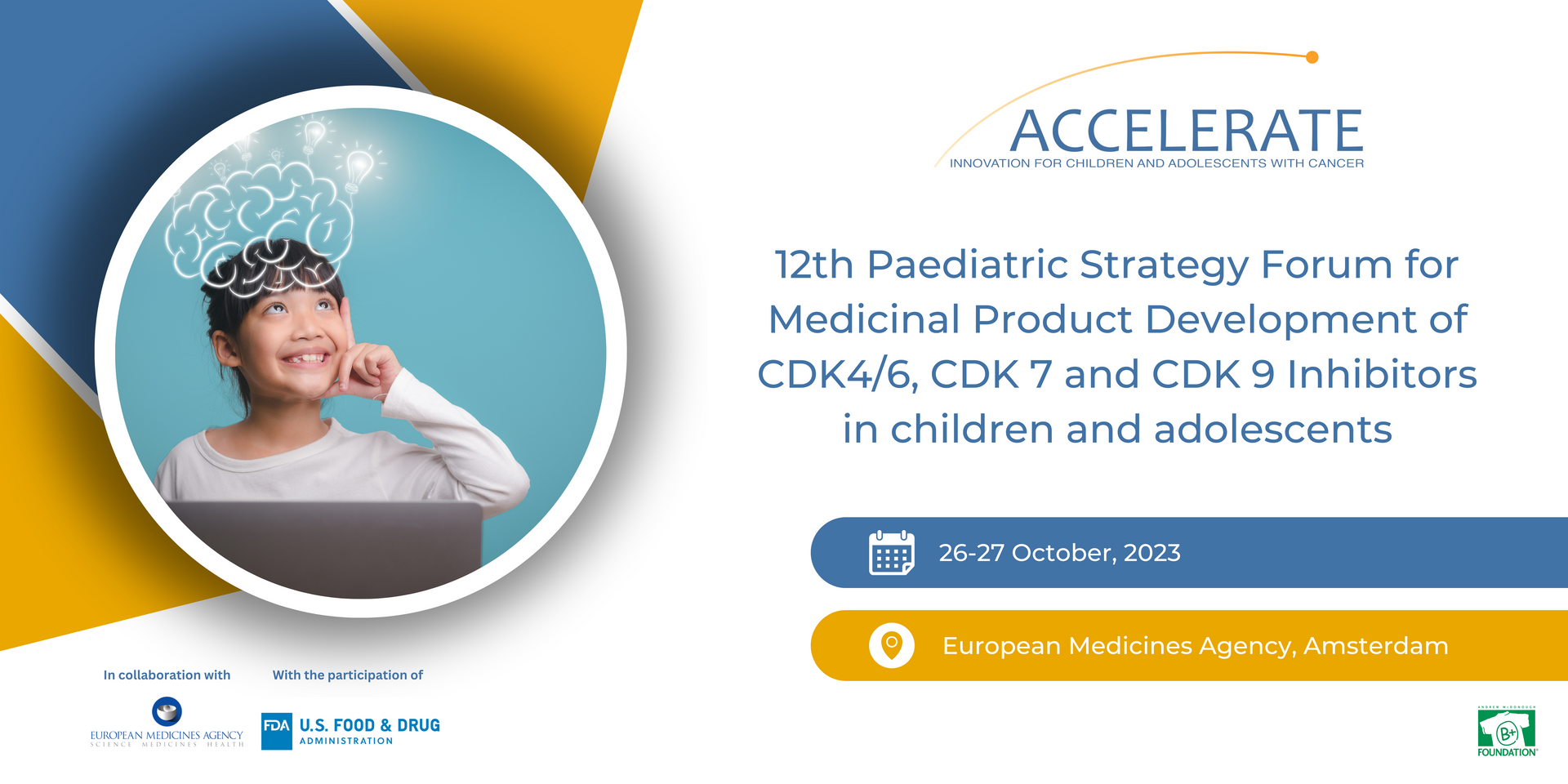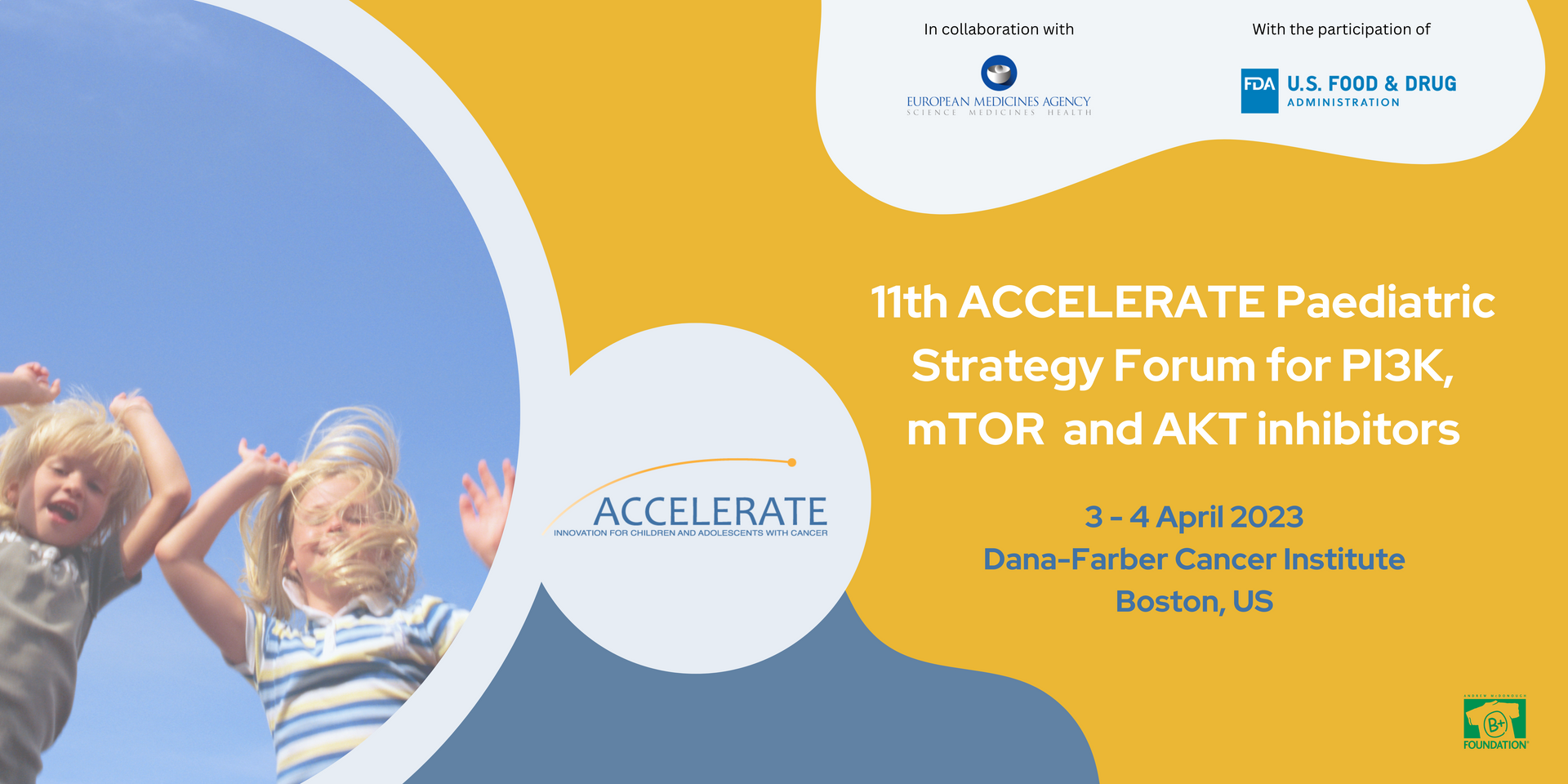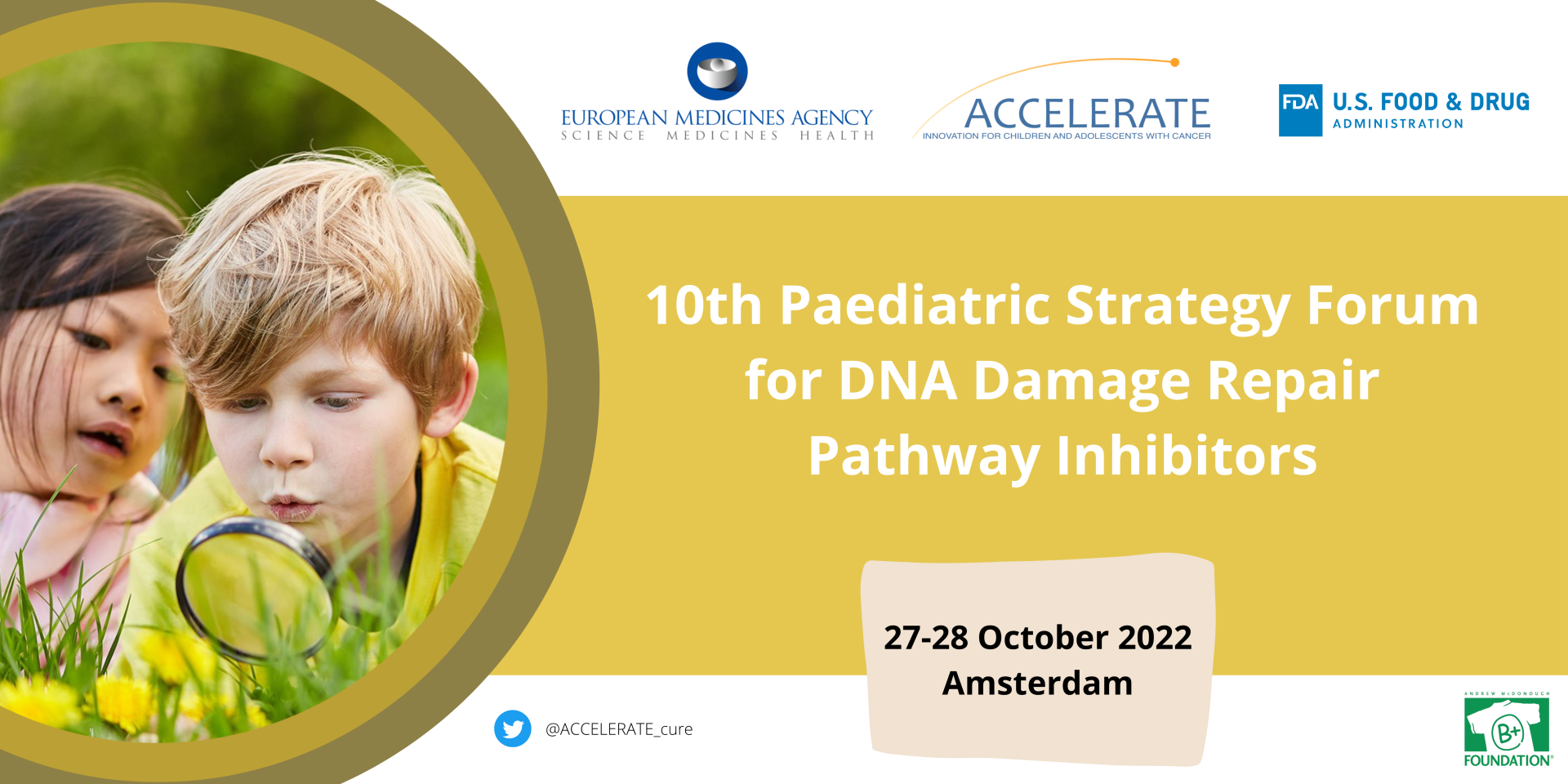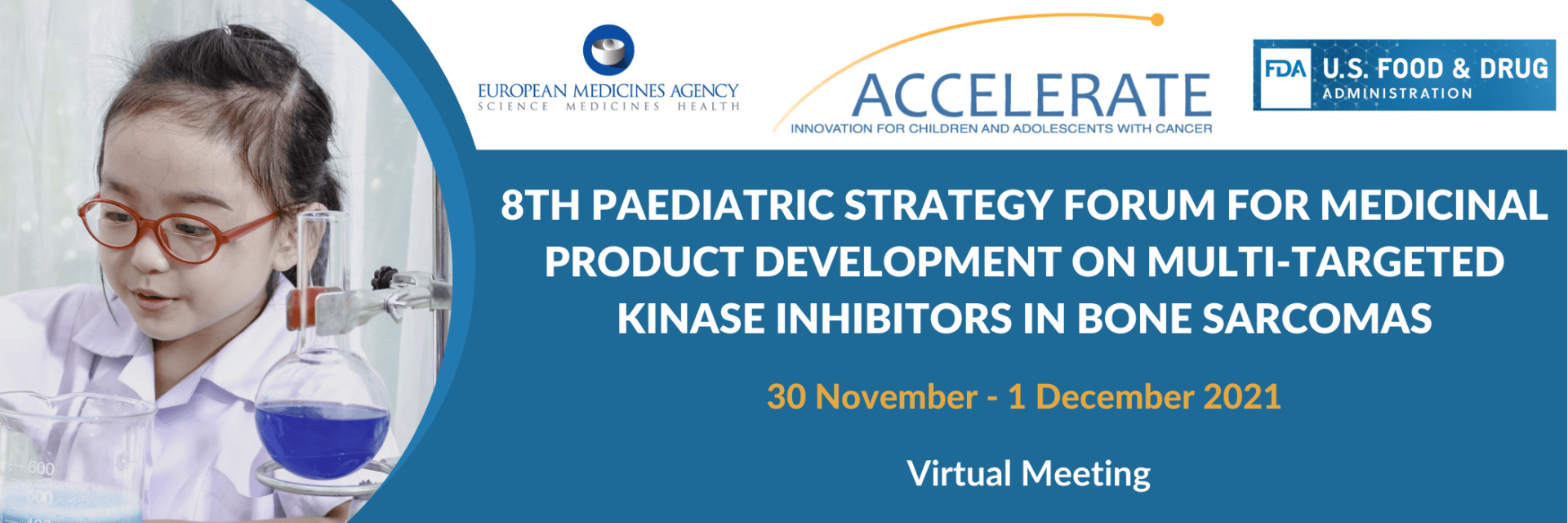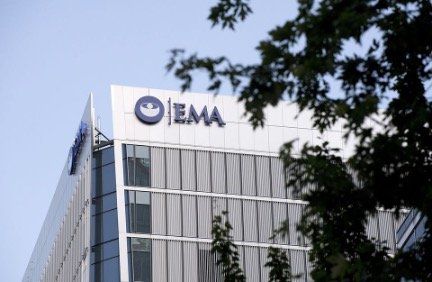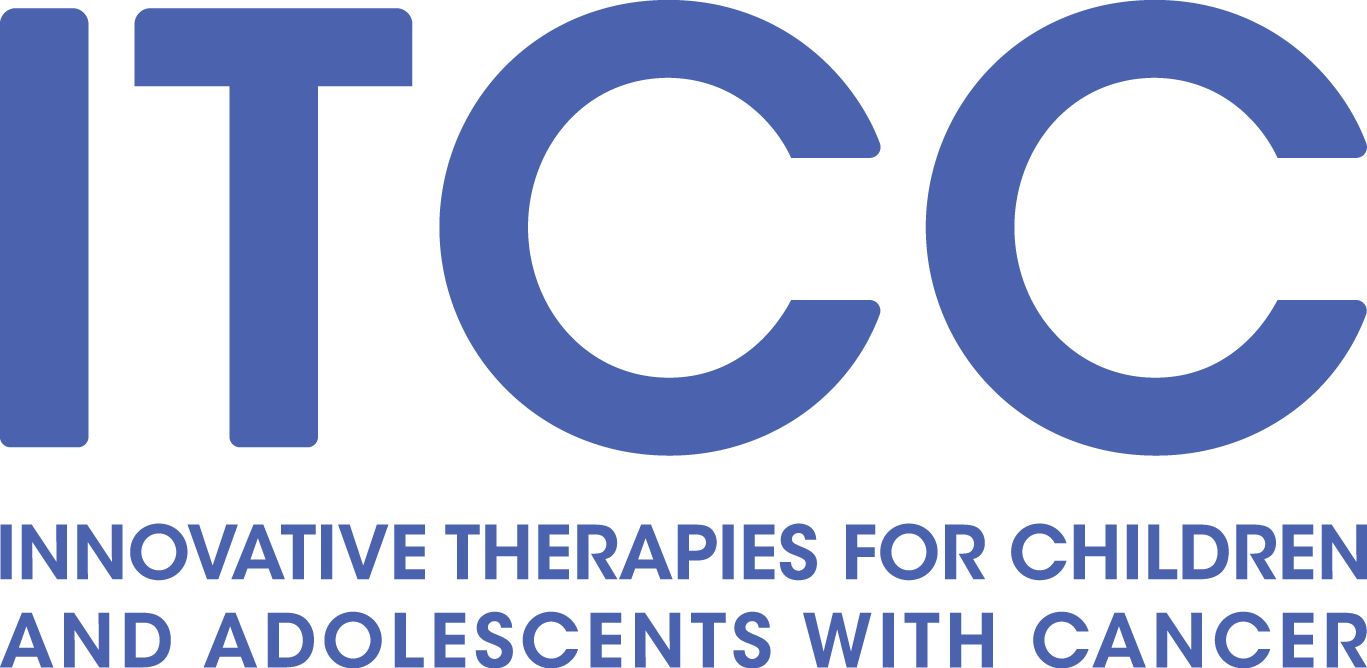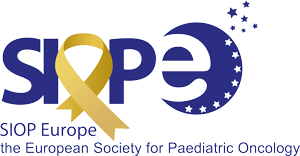Past Forums
26 and 27 October 2023 | EMA, Amsterdam
12th Paediatric Strategy Forum for CDK4/6, CDK 7 and CDK 9 Inhibitors
ACCELERATE in collaboration with the European Medicines Agency with participation of the Food and Drug Administration
Paediatric Strategy Forums have been created to evaluate the current state of the science, facilitate dialogue, and provide an opportunity for constructive discussions between relevant stakeholders (patient advocates, clinicians, academics, biotechnology/pharmaceutical companies, and regulators) on specific topics in an open forum to assure development of medicines in the best interests of children and adolescents with cancer.
The goal of these meetings is to share information, to facilitate the development of innovative medicines and ultimately their introduction into the standard-of-care of children with malignancies.
The Twelfth Multi-Stakeholder Paediatric Strategy Forum organised by ACCELERATE in collaboration with the European Medicines Agency (EMA) and with the participation of the U.S. Food and Drug Administration (FDA) will focus on CDK4/6, CDK7 and CDK9 Inhibitors.
The cyclin-dependent kinase (CDK) pathway is a series of complexes formed between cyclins and their associated kinases. This pathway, along with its inhibitors and regulators controls the orderly progression through each stage of the cell cycle. The abnormal activation of CDKs results in uncontrolled cancer cell proliferation and the induction of cancer stem cell characteristics.
CDKs 4 and 6 belong to the subgroup of CDKs that specifically regulate cellular transition from the G1 phase of the cell cycle to the S phase, and CDK4/6 inhibitors effectively block the proliferation of sensitive cancer cells by inducing G1 cell cycle arrest. CDK4/6 inhibitors are rapidly transforming the care of adult patients with hormone receptor positive, human epidermal growth factor receptor 2-negative advanced breast cancer. Genetic aberrations in paediatric tumours, including neuroblastoma and malignant rhabdoid tumours, increase CDK 4/6 activity and thus make this pathway an attractive therapeutic target. In paediatric oncology CDK4/6 inhibitors have been initially evaluated in monotherapy and more recently, in combination. There are currently 29 ongoing or completed trials with CDK4/6 inhibitors, of which 20 are in combination with other anticancer drugs. To date the efficacy of monotherapy has been largely disappointing and it is unclear which combinations to prioritise and what are relevant biomarkers.
The main function of another subgroup of CDKs is to control transcriptional processes and CDK9 is one of the most important transcription regulatory members of this subgroup. It controls many cellular functions including proliferation, survival, cell cycle regulation, DNA damage repair and metastasis. Substantial enhanced activity of CDK9 is observed in multiple cancer types, which is universally associated a worse prognosis. CDK9 inhibitors are early in development in adult and paediatric oncology.
In addition, CDK7 accomplishes dual functions in cell-cycle control and transcription and a number of selective small molecule inhibitors of CDK7 have been developed. The Forum will focus on CDK4/6, CDK7 and CDK9 inhibitors.
The Paediatric Strategy Forum aims to clearly ascertain the role of these pathway in paediatric cancer and review the relevant preclinical data. For CDK4/6 inhibitors the Forum will: i) review data for activity of monotherapy and combinations and ii) discuss the optimal combinations. For CDK7 and CDK9 inhibitors the aim will be to provide overview and to discuss their current and future development. The goal is to formulate a consensus between all stakeholders on how best to take forward the development of this class of products.
FORMAT
This forum will be held in person and all participants are strongly encouraged to attend it. For attendees unable to travel or if travel restrictions prevent an in person event, a virtual option will be available.
Forum Output: Publication of a summary and manuscript from all participants addressing the challenges and documenting the conclusions of the meeting. Potentially further specific meetings relating to areas which require more in-depth discussion will be arranged.
3 and 4 April 2023 | Boston
11th ACCELERATE Paediatric Strategy Forum for PI3K, mTOR and AKT inhibitors
ACCELERATE in collaboration with the European Medicines Agency with participation of the Food and Drug Administration
Background: Paediatric Strategy Forums have been created to evaluate the current state of the science, facilitate dialogue, and provide an opportunity for constructive discussions between relevant stakeholders (patient advocates, clinicians, academics, biotechnology/pharmaceutical companies, and regulators) on specific topics in an open forum to assure development of medicines in the best interests of children and adolescents with cancer. The goal of these meetings is to share information, to facilitate the development of innovative medicines and ultimately their introduction into the standard-of-care of children with malignancies.
The Eleventh Multi-Stakeholder Paediatric Strategy Forum organised by ACCELERATE in collaboration with the European Medicines Agency (EMA) and with the participation of the U.S. Food and Drug Administration (FDA) will focus on PI3K/AKT/mTOR Pathway Inhibitors.
The PI3K-mTOR-AKT pathway is upregulated in many paediatric cancers, particularly neuroblastoma, central nervous system tumours and leukaemia. Therefore this pathway is a potential important target in which to develop new drugs for childhood cancer. A large array of inhibitors of this pathway have been developed for adult cancers, however the best use of these inhibitors and how best to combine them with other agents commonly used in children is unknown. Despite the large number inhibitors and the relevance to children’s cancer, inhibition of the pathway has not to date had a major impact for children and adolescents with cancer and there is only one front-line trial incorporating this class of drugs.
The Forum will focus on PI3K, mTOR, AKT, TORC1/2 kinase and GSK3β inhibitors.
The Paediatric Strategy Forum aims to i) clearly ascertain the role of this pathway in paediatric cancer; ii) identify which of the very many types of inhibitors are of highest value for children; and iii) suggest optimal combinations.
Specifically the Forum will overview the relevant biology; highlight genetic disorders for which mutations in this pathway are drivers of the diseases (SEGA and overgrowth conditions) in which PI3K/ATK/mTOR inhibitors are active; discuss specific indications in adults where these inhibitors are active and the reasons for this; present the genomic landscape in children and potential genomic predictors for activity; describe lessons learnt from mTOR inhibitors and finally discuss combination strategies.
The immune and metabolic effects of PI3K inhibitors, the potential for toxicity from combinations and optimal scheduling will be considered
The goal is to formulate a consensus between all stakeholders on how best to take forward the development of this class of products.
Format: This forum will be held in person and all participants are strongly encouraged to attend in person. For attendees unable to travel or if travel restrictions prevent an in person event, a virtual option will be available.
Forum Output: Publication of a summary and manuscript from all participants addressing the challenges and documenting the conclusions of the meeting. Potentially further specific meetings relating to areas which require more in-depth discussion will be arranged.
27 and 28 October 2022 | Amsterdam
10th Paediatric Strategy Forum for DNA Damage Pathway Inhibitors
ACCELERATE in collaboration with the European Medicines Agency with participation of the Food and Drug Administration
Background: Paediatric Strategy Forums have been created to evaluate the current state of the science, facilitate dialogue and provide an opportunity for constructive discussions between relevant stakeholders (patient advocates, clinicians, academics, biotechnology/pharmaceutical companies and regulators) on specific topics in an open forum to assure development of medicines in the best interests of children and adolescents with cancer. The goal of these meetings is to share information, to facilitate the development of innovative medicines and ultimately their introduction into the standard-of-care of children with malignancies.
The Ninth Multi-Stakeholder Paediatric Strategy Forum, organised by ACCELERATE in collaboration with the European Medicines Agency (EMA) and with the participation of the U.S. Food and Drug Administration (FDA) will focus on MAPK pathway inhibitors in paediatric tumours and malignancies.
Activating mutations of the MAPK pathway are frequently associated with paediatric tumours and malignancies where there are currently unmet needs. A range of inhibitors of the MAPK pathways has been developed and evaluated in adults, but only one has received regulatory approval in children. BRAF-V600E is identified in approximately 7% of all human cancers. BRAF-V600E inhibitors have been demonstrated to be active in low-grade gliomas, high-grade gliomas, Langerhans cell histiocytosis and some solid tumours. MEK inhibitors have also been active in plexiform neurofibroma, low-grade gliomas, high-grade gliomas and Langerhans cell histiocytosis, but definitive activity in other paediatric tumours has not been clearly demonstrated. The complexity and differences in the (epi)genomic landscape of different childhood tumours likely predicts this variation in response to MAPK/ERK blockade with targeted agents.
The Paediatric Strategy Forum will address the key issues in the ongoing development of inhibitors of the MAPK pathway in paediatric oncology. This will include prioritization of medicinal products, identifying the optimal combinations, dosing schedules and treatment duration in the landscape of current unmet needs while acknowledging biological differences in tumours. The importance of the use of appropriate methodologies to detect the molecular targets and evaluate responses to therapy, the crucial importance of formulation, different pharmacokinetics and pharmacodynamic properties including central nervous system penetration and short- and long-term toxicities will also be reviewed.
Forum Output: Publication of a summary and manuscript from all participants addressing the challenges and documenting the conclusions of the meeting. Potentially further specific meetings relating to areas which require more in-depth discussion will be arranged.
6 June 2022 | Virtual
Prioritisation Meeting on Menin Inhibitors
An overview of the molecular mechanisms of response to menin inhibitors and the role of menin inhibitors in leukaemia and relevant epidemiology were presented by academic experts.
Details of six menin inhibitors were presented by industry representatives.
Four themes were discussed:
- Considerations for menin inhibitors;
- Are five separate trials needed to determining efficacy across targeted leukaemias?
- An effective strategy to evaluate menin inhibitors in a limited population;
- How to move forward rapidly to front-line?
28 and 29 March 2022 | Virtual
9th Paediatric Strategy Forum for Medicinal Product Development in MAPK pathway inhibitors
ACCELERATE in collaboration with the European Medicines Agency with participation of the Food and Drug Administration
The Ninth Multi-Stakeholder Paediatric Strategy Forum, organised by ACCELERATE in collaboration with the European Medicines Agency (EMA) and with the participation of the U.S. Food and Drug Administration (FDA) focused on MAPK pathway inhibitors in paediatric tumours and malignancies.
Background and objectives
Background: Paediatric Strategy Forums have been created to evaluate the current state of the science, facilitate dialogue and provide an opportunity for constructive discussions between relevant stakeholders (patient advocates, clinicians, academics, biotechnology/pharmaceutical companies and regulators) on specific topics in an open forum to assure development of medicines in the best interests of children and adolescents with cancer. The goal of these meetings is to share information, to facilitate the development of innovative medicines and ultimately their introduction into the standard-of-care of children with malignancies.
Focus: Activating mutations of the MAPK pathway are frequently associated with paediatric tumours and malignancies where there are currently unmet needs. A range of inhibitors of the MAPK pathways has been developed and evaluated in adults, but only one has received regulatory approval in children. BRAF-V600E is identified in approximately 7% of all human cancers. RAF inhibitors have been demonstrated to be active in low-grade gliomas, high-grade gliomas, Langerhans cell histiocytosis and some solid tumours. MEK inhibitors have also been active in plexiform neurofibroma, low-grade gliomas, high-grade gliomas and Langerhans cell histiocytosis, but definitive activity in other paediatric tumours has not been clearly demonstrated. The complexity and differences in the (epi)genomic landscape of different childhood tumours likely predicts this variation in response to MAPK/ERK blockade with targeted agents.
The Paediatric Strategy Forum addressed the key issues in the ongoing development of inhibitors of the MAPK pathway in paediatric oncology. This will include prioritization of medicinal products, identifying the optimal combinations, dosing schedules and treatment duration in the landscape of current unmet needs while acknowledging biological differences in tumours. The importance of the use of appropriate methodologies to detect the molecular targets and evaluate responses to therapy, the crucial importance of formulation, different pharmacokinetics and pharmacodynamic properties including central nervous system penetration and short- and long-term toxicities will also be reviewed.
Forum Output: Publication of a summary and manuscript from all participants addressing the challenges and documenting the conclusions of the meeting. Potentially further specific meetings relating to areas which require more in-depth discussion will be arranged.
30 November / 1 December 2021 | Virtual
8th Paediatric Strategy Forum for Medicinal Product Development on Multi-Targeted Kinase Inhibitors in Bone Sarcomas
ACCELERATE in collaboration with the European Medicines Agency with participation of the Food and Drug Administration
The 8th ACCELERATE multi-stakeholder Paediatric Strategy Forum took place virtually on 30 November / 1 December with the participation of almost 200 participants from 26 countries worldwide. The Forum focused on development of medicinal products on Multi-Targeted Kinase Inhibitors in Bone Sarcomas.
The Forum used osteosarcoma as a “proof of concept” for other sarcomas and explore key issues by addressing:
i) Relevance of mTKIs (based on biology, pre- and clinical evidence) in bone sarcomas that warrant further development;
ii) Any possible mTKIs potentially not relevant in bone sarcomas;
iii) Best approach to identifying relevant biomarkers;
iv) Approach to drug selection, dosing and schedule when moving mTKIs into combination trials in bone sarcomas in order to minimize toxicity;
v) Identification of best stage of therapy when mTKIs should be employed.
The output of the Forum will be a published summary and a manuscript from all participants addressing the challenges and documenting the conclusions of the meeting. Potentially further specific meetings relating to areas which require more in-depth discussion will be arranged.
Stay tuned for more information!
25, 26 and 27 May 2021 | 4pm to 8pm CET (10am-2pm EST / 7am-11am PST) each day | Virtual
7th Paediatric Strategy Forum for Medicinal Product Development of CAR T-cells in Children and Adolescents
ACCELERATE in collaboration with the European Medicines Agency with participation of the Food and Drug Administration
Background and objectives
The 7th multi-stakeholder Paediatric Strategy Forum, organised by ACCELERATE in collaboration with the European Medicines Agency (EMA) and with the participation of the U.S. Food and Drug Administration (FDA), focused on CAR T-cells in children and adolescents and took place virtually on 25-27 May 2021 with almost 200 participants worldwide.
Chimeric antigen receptor T cells (CAR T-cells) have been a major advance in the field of cancer therapy. To date the predominant focus has been on haematological malignancies and there are currently many clinical trials and many products being evaluated in adults and children. Cellular immunotherapy with CD19-directed CAR T-cells is a promising approach for the treatment of B-cell acute lymphoblastic leukaemia (ALL) the most advanced area at present. However, there are many unanswered questions regarding the use of developed products and the development of new products. The role of CAR T-cells in both leukaemia and solid tumours were addressed during the Paediatric Strategy Forum.
Forum Goals: to summarise the current status of the development of CAR T-cells in paediatrics; identify current challenges, future directions and ascertain the best strategies to accelerate their development and their availability to children.
Forum Output: publication of a summary and manuscript from all participants addressing the challenges and documenting the conclusions of the meeting. Potentially further specific meetings relating to areas which require more in-depth discussion will be arranged.
Background: Paediatric Strategy Forums have been created to evaluate the current state of the science, facilitate dialogue and provide an opportunity for constructive discussions between relevant stakeholders (patient advocates, clinicians, academics, biotechnology/pharmaceutical companies and regulators) on specific topics in an open forum to assure development of medicines in the best interests of children and adolescents with cancer. The goal of these meetings is to share information, to facilitate the development of innovative medicines and ultimately their introduction into the standard-of-care of children with malignancies.
The summary of the first five Paediatric Strategy Forums held in January and November 2017, September 2018, April 2019 and January 2020 on ALK inhibition, mature B-cell malignancies, and checkpoint inhibitors in combination, acute myeloid leukaemia and epigenetic modifiers respectively can be found here.
13-14 January 2021 | Virtual – upcoming
6th Paediatric Strategy Forum for anaplastic lymphoma kinase (ALK) inhibition in paediatric malignancies
ACCELERATE in collaboration with the European Medicines Agency with participation of the Food and Drug Administration
ACCELERATE, in collaboration with the EMA, and with participation of the FDA, held a virtual Paediatric Strategy Forum on anaplastic lymphoma kinase (ALK) inhibition in paediatric malignancies on 13 and 14 January 2021 over two half days.
In 2017 the first Paediatric Strategy Forum on ALK inhibition was held and as it was three years since this meeting, four more Paediatric Strategy Forums have been held and the landscape of ALK inhibitors had evolved. It was believed that it would be beneficial to hold the 6th Paediatric Strategy Forum on ALK inhibition in paediatric malignancies.
The goal of the Forum was to share information between all stakeholders, to evaluate science, to inform paediatric drug development strategies and subsequent decisions. The 6th Paediatric Strategy Forum aimed at:
- Reviewing ALK biology in neuroblastoma, inflammatory myofibroblastic tumour, anaplastic large cell lymphoma and central nervous system tumours
- Identifying the current unmet needs in children
- Identifying lessons learnt in last three years
- Planning how do we evaluate second/third generation products (if unmet needs are) fulfilled?
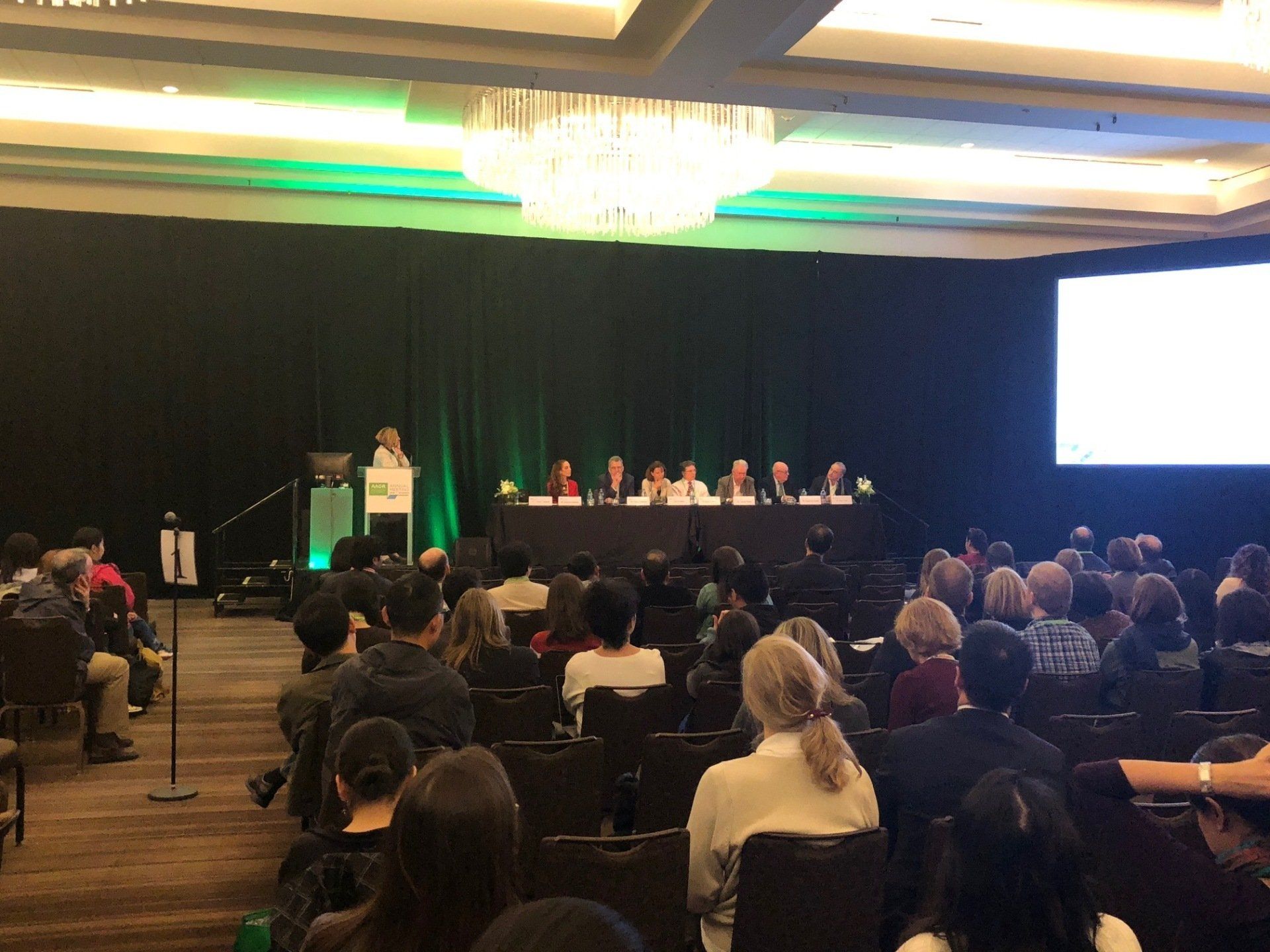
Bildtitel
Untertitel hier einfügenButton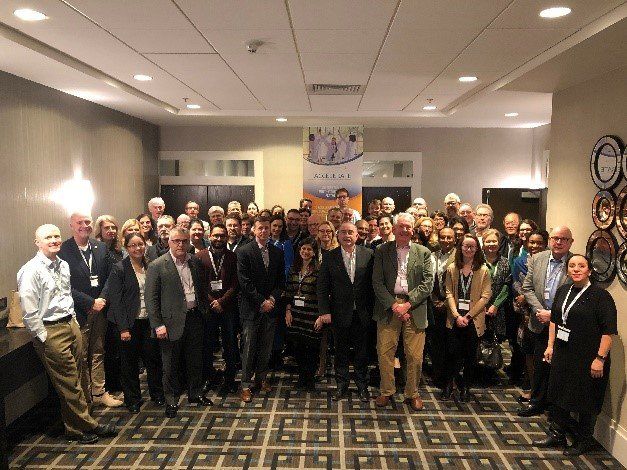
Bildtitel
Untertitel hier einfügenButton
23-24 January 2020 Wyndham Philadelphia Historic District Hotel | 400 Arch Street, Philadelphia, USA
5th Paediatric Strategy Forum for Medicinal Product Development of Epigenetic Modifiers in Children and Adolescents
The first ACCELERATE Paediatric Strategy Forum in the US – a focus on Epigenetic Modifiers
The 5th multi-stakeholder Paediatric Strategy Forum, organised by ACCELERATE with the support of the Alex’s Lemonade Stand Foundation and in collaboration with the European Medicines Agency (EMA) and with participation of the Food and Drug Administration (FDA) was held in Philadelphia on 23 and 24 January 2020 and focused on epigenetic modifiers in children and adolescents.
The Forum:
The specific aims of the Forum were:
- to identify epigenetic targets or mechanisms of action relevant to paediatric cancers and
- to define the landscape for paediatric drug development of epigenetic modifiers.
DNA methyltransferase inhibitors/hypomethylating agents and histone deacetylase (HDAC) inhibitors were largely excluded from discussion as the aim was to discuss those targets for which therapeutic agents are early in development.
Seventy two participants (in person) from both North America and Europe (academic experts, patient advocates from Children’s Cause for Cancer Advocacy, Coalition Against Childhood Cancer, Alex’s Lemonade Stand, KickCancer, Solving Kids’ Cancer and the Andrew McDonough B+ Foundation; EMA [including the Paediatric Committee] and FDA regulators) and representatives from 11 biopharmaceutical companies discussed the scientific rationale for the epigenome to be a therapeutic target across all paediatric malignancies.
A comprehensive overview of the scientific rationale for epigenetic modifiers in paediatric leukaemia, central nervous system tumours and solid tumours was presented as well as the pharmacological and clinical information on seventeen compounds being developed as epigenetic modifiers.
Conclusions of the Forum
The epigenetic landscape is an evolving field and is highly relevant to many paediatric cancers; the biology is elegant and new targets are emerging constantly. Targeting epigenetics is considered a very important therapeutic approach in paediatric malignancy, which has yet to achieve its full potential, as, many targets do not yet have drugs available.
A combination approach is critical for many epigenetic modifiers (e.g. EZH2 and EED) and exploration of the optimum combination should be underpinned by extensive preclinical research in advance of clinical translation.
The Forum greatly encouraged more extensive pre-clinical research. Eight classes of medicinal products were discussed and prioritised, based on the level of science to support early evaluation in children: menin, DOT1L, EZH2, EED, BET, PRMT5, LSD1 inhibitors and retinoic acid receptor alpha agonists. Menin inhibitors should be moved rapidly into paediatric development, in view of their biological rationale, pre-clinical activity and ability to fulfil an unmet clinical need.
A follow up multi-stakeholder meeting focusing on BET inhibitors will be held to define how to prioritise the multiple compounds in clinical development that may need to be evaluated in children and evaluate their specific roles. As epigenetic modifiers are early in development, there is a major opportunity to define the landscape of epigenetic modifiers in order that efficient and optimum plans for their evaluation in children and adolescents are developed. A detailed manuscript describing the conclusions of the Forum is in preparation.
5 November 2019 | Paris, France
Follow up meeting to the 4th Paediatric Strategy Forum on Medicinal Product Development in Acute Myeloid Leukaemia
Following the 4th Paediatric Strategy Forum, two meetings will take place on 5th November 2019 in Paris, France.
These meetings will bring together academics and representatives of bio pharma companies to discuss FLT3 inhibitors and medicinal products targeting CD123.
For further information about this meeting, please send an email to: contact@accelerate-platform.org
11-12 April 2019 | Rotterdam, Netherlands
4th Paediatric Strategy Forum: Acute Myeloid Leukaemia in Children and Adolescents
The fourth multi-stakeholder Paediatric Strategy Forum will focus on medicinal product development for acute myeloid leukaemia in children and adolescents.
Background and objectives
Paediatric Strategy Forums have been created to facilitate dialogue and provide an opportunity for constructive interactions between relevant stakeholders (parents /patients representatives, clinicians, academics, pharmaceutical companies and regulators) on topics requiring an open discussion on the development of medicines in the best interests of children and adolescents with cancer. The goal of this meeting is to share information, in a pre-competitive setting, to facilitate the developments of innovative medicines and ultimately their introduction into the standard-of-care of children with malignancies.
The first three Paediatric Strategy Forums were on anaplastic lymphoma kinase inhibition held in January 2017, on mature B-cell malignancies in November 2017 and immune checkpoint inhibitor combinations in September 2018.
There are a number of challenges in developing new medicinal products for children and adolescents with acute myeloid leukaemia. These include the relatively small population of children with acute myeloid leukaemia compared to adults; the different therapeutic approach and better outcomes in paediatrics compared to AML in adults; the various molecular sub-types, and the number of new medicines in some classes. An additional challenge is that there is attrition with some drugs, which may be effective in children, due to a different risk-benefit profile than in the elderly where they are often first explored. These challenges become even more complex in the context of different regulatory frameworks.
Within this context, some of the key questions addressed in the Paediatric Strategy Forum will include:
- The challenges of clinical trials of new drugs for children with acute myeloid leukaemia.
- How to make the best choices of innovative medicines?
- How can extrapolation of data from adults to children be best employed?
- How to coordinate paediatric development plans of novel agents to accommodate global development plans in the context of international academic clinical trial networks?
- When is it appropriate to evaluate new drugs in children with acute myeloid leukaemia in first relapse, second relapse and/or front line?
The epidemiology, biology, standard therapy, therapeutic needs and future therapeutic plans in North America and Europe for acute myeloid leukemia in children and adolescents will be discussed at this Forum. This will be followed by presentations of non-clinical and clinical information on medicinal products being developed by pharmaceutical companies.
The output will be a published summary and manuscript from all participants addressing the challenges and documenting the conclusions.
The deadline for the Expression of Interest was 20 January 2019
5 - 6 September 2018 | EMA, London, UK
The third multi-stakeholder Paediatric Strategy Forum, jointly organised by ACCELERATE and the European Medicines Agency (EMA) will focus on checkpoint inhibitors used in combination therapy, in children and adolescents.
Paediatric Strategy Forums have been created to facilitate dialogue and provide an opportunity for constructive interactions between relevant stakeholders (patients/patient representatives, clinicians, academics, pharmaceutical companies and regulators) on topics requiring open discussion on development of medicines in the best interests of children and adolescents with cancer. The goal of this meeting is to share information, in a pre-competitive setting, to facilitate the developments of innovative medicines and ultimately their introduction into the standard-of-care of children with malignancies.
- The summary of the first Paediatric Strategy Forum held in January 2017 on ALK inhibition in paediatric malignancies can be found here
- The summary of the second Paediatric Strategy Forum held in November 2017 on Medicinal Product Development for Mature B cell Malignancies in Children can be found here.
Immune checkpoint inhibitors have shown impressive success in some adult malignancies, in particular, monoclonal antibodies that block the interaction between programmed death ligand 1 (PD-L1) on the surface of tumour or antigen-presenting cells, and programmed death 1 (PD-1) on the surface of lymphocytes. Many of these products have now been licensed as first or second line treatments for adult malignancies.
Furthermore the combination of antibodies targeting PD-1 with those targeting the immune checkpoint molecule CTLA-4 has shown particularly high response rates especially in adult patients with metastatic melanoma. Early phase trials in children of single agent checkpoint inhibitors are currently being presented. High response rates are being observed in some cancers common to children and adults as for example in Hodgkin lymphoma. However, these results appear not to be reflected in typical paediatric malignancies. Some combination studies are in progress and others are planned. It therefore seems opportune to review the early results of these early phase trials in children and consider opportunities for paediatric studies in which check-point inhibitors are used in combination including also possible other approaches.
In the Forum the immunological environment of paediatric malignancies, checkpoint inhibitors in early phase clinical studies in paediatrics, strategies combining checkpoint inhibitors with other products and alternative immunotherapy strategies will be reviewed.
The output will be a published summary from all participants addressing the challenges and documenting the conclusions.
13-14 November 2017 | EMA, London, UK
The second multi-stakeholder Paediatric Strategy Forum, jointly organised by ACCELERATE and the EMA, focused on mature B cell malignancies (lymphoma and leukaemia) in children.
In this scientific meeting, there was interaction between all stakeholders (patients/patient representatives, clinicians, academics, pharmaceutical companies, and regulators) with an interest in drug development for children and adolescents with cancer. The goal of this meeting was to share information, in a pre-competitive setting, which would inform a paediatric drug development strategy and subsequent decisions and facilitate the developments of innovative medicines for the treatment of children with mature B cell malignancies.
The summary of the first Paediatric Strategy Forum held in January 2017 on ALK inhibition in paediatric malignancies can be found here.
The current therapy for high-risk mature B-cell malignancies with multi-agent chemotherapy and rituximab was evaluated in an international trial in Europe, the US and Asia (Inter B NHL Ritux 2010). The trial resulted in one year event free survival (EFS) rates (95%CI) of 94.2% (88.5% – 97.2 %), which is similar to other first-line protocols. Chemotherapy alone results in greater than 96% EFS for patients with a standard-risk disease. The acute toxicity is significant but most survivors have no or mild long term toxicity.
Therefore, the current unmet therapeutic needs for mature B cell malignancies in children are:
- To reduce the high acute toxicity of current therapy. However, further reduction of intensive therapy leads to reduced rates of cure;
- To develop innovative treatments for patients remaining incurable.
There are a number of medicines being developed for B cell malignancies in adults; however most of the malignancies in adults differ from those in children. Therefore the challenges are:
- To identify which of the many potential new drugs will have a) the optimal probability of improving cure rates in those patients who currently have chemo resistant disease and b) the optimal success in reducing toxicity in the majority of patients
- To design and execute scientifically sound studies in very small populations with refractory or relapsed mature B cell malignancies
- To design and execute scientifically sound and ethical studies in populations to reduce toxicity with a very high rate of cure.
The epidemiology, clinical features, biology, similarities and differences compared to adult B-cell malignancies, current international standard approaches and therapeutic needs of mature B cell malignancies were presented at the Forum. The medicines for B cell malignancies in development, relevant pre-clinical data and data from all paediatric clinical trials completed or in progress, sponsored by industry or academia, were reviewed. The output will be a published summary from all participants addressing the challenges and documenting the conclusions.
The number of participants was restricted and parties who wish to participate (patients/parent-representatives, academia, clinicians, industry) were asked to express their interest to participate*.
For clinicians/researchers, priority was given to those who have expertise and experience in clinical trials for mature B cell malignancies in children or intend to design studies in the future. Participation in the Forum was on invitation only.
If you have any questions or comments, please contact us: contact@accelerate-platform.eu or visit the EMA webpage.
*Please note that deadline for Expression of Interest was 30 June 2017.
Supported by
-
Andrew McDonough
Button

